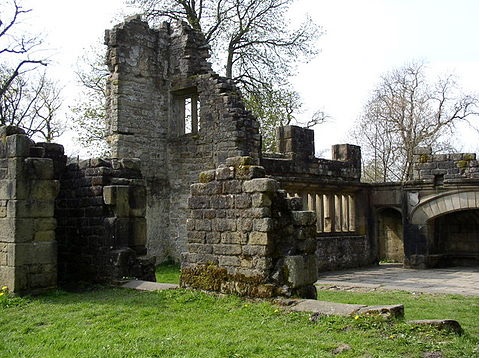
I’ve been working off and on with a short story idea, in which Jane Rochester solves her first mystery immediately after her marriage. The tale revolves around Ferndean Manor, the setting of the final scene of Jane Eyre. I guess it’s sort of a prequel to The Hour of Fatality, which I’m currently proofreading, but it’s a standalone mystery. Here’s the very beginning. If it sounds intriguing, let me know. Or you can sign up for my mailing list, and I’ll let you know when it’s completed and available.
For lack of anything more mysterious, it’s tentatively titled:
Ferndean
“Jane!”
“Mr. Rochester!”
I entered the study with a keen and lively step. I had only gone as far as the kitchen, no great sojourn at Ferndean Manor, but on one’s wedding day, even a trifling separation is an excuse for a pleasant reunion. Mr. Rochester reached out his arm, and I stepped into his embrace.
“We have passed through fire, trial, and the pain of separation, to a safe harbor and sheltered bourn. I never thought to find any happiness at Ferndean.” He stood behind me, his arms holding me to him. The sun cast brilliant beams through the window; it seemed the very smile of Providence to warm us. “You do not regret having no the bridal journey? No fine gown and rich jewels? I have not disappointed your expectations?”
“Do you know, Mr. Rochester, that there is a bloom of woodland flowers just outside this window?” I replied, not altogether to the purpose.
“Then you shall have Eglantine as a bit of lace, and Honeysuckle as a veil? What shall you take for jewels, my fairy? A bead of dew to adorn your neck, and a filament of ivy to cover your wrist. Is that all that you desire?”
“I am crowned with my husband’s love. No other adornment could satisfy me so well.”
“You are a woman of rare taste, Jane. But I’ll not complain of my good fortune. If this is the fate Heaven offers me, I shall call Paradise premature in its arrival.”
I touched the scar on his forehead, where the fiery tragedy of the past had left its mark. I passed my fingers over his blinded eyes. If I could bring my husband nectar and ambrosia in his condition, I would be well rewarded by the kindness of his love. A departure from sentiment, however, was not unwelcome, even on the dawning day of one’s marriage.
“I find I am rather thirsty for paradise. With your approval, I will summon Mary to bring us tea.” He tweaked my finger and allowed me to pass. Mary brought the tea tray at once.
“Is there no milk?” I inquired.
“No milk? You cannot offer Mrs. Rochester tea without milk,” my husband proclaimed.
“The milkman hasn’t come yet, sir. He’s usually here by this time,” Mary said.
I glanced out the window unconsciously, as if I might catch sight of the young farmer atop his cart. I saw something there that I did not expect, however, and replied, “The milkman? Or the milkman’s horse?”
Out the window of the parlour I could see a tall roan busy with a mouthful of carrot tops. The steed stood at the edge of the kitchen garden and bent his head to devour more of the plentiful greens flourishing there. Hitched to his chest were the traces of a wagon, and by leaning forward, I could see what was most certainly a milkman’s wagon precariously perched over the edge of the lane that led to the back regions of the house.
An exclamation fled from Mary’s lips and she dashed from the room. I briefly described the scene to Mr. Rochester, and to my gratification, he laughed. His mirth was short lived however.
“John is at the top of the hill mending a broken fence, and Mary is occupied saving her lettuces. Leave me for a little while, Jane, and have a look around for the fellow. Perhaps you can discover what has separated him from his cart.”
I acted on his instructions and went out the door, my eyes searching for the tall farmer and his straw hat that I had seen once before. I hoped no disaster had befallen him.